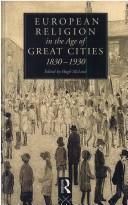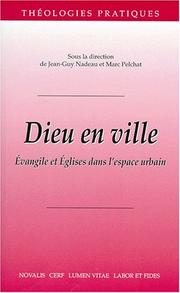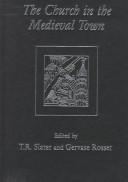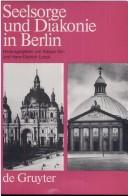| Listing 1 - 10 of 18 | << page >> |
Sort by
|

ISBN: 1134867131 1280138580 9786610138586 020399308X 9780203993088 9780415095228 0415095220 6610138583 9781134867134 0415095220 9781280138584 9781134867080 9781134867127 9781138006706 1134867123 Year: 1995 Publisher: London ; New York Routledge
Abstract | Keywords | Export | Availability | Bookmark
 Loading...
Loading...Choose an application
- Reference Manager
- EndNote
- RefWorks (Direct export to RefWorks)
Europe in the nineteenth century saw spectacular growth in the size and number of cities and in the proportion of the population living in urban areas. Many contemporaries thought that this social revolution would bring about an equally dramatic change in religious life. This book, written by an international team of specialists, provides an authoritative account of religious change, both at the institutional and popular level, in Catholic, Protestant and Orthodox cities, in seven European countries.
Cities and towns --- City churches --- Churches, City --- Churches, Town --- Churches, Urban --- Town churches --- Urban churches --- Urbanization --- Church work --- City clergy --- Suburban churches --- Global cities --- Municipalities --- Towns --- Urban areas --- Urban systems --- Human settlements --- Sociology, Urban --- Religious aspects --- Christianity. --- History --- Europe --- Church history --- Religious aspects&delete& --- Christianity --- 19th century --- 20th century

ISBN: 2890889610 2204060712 2873241055 2830908910 9782204060714 9782830908916 9782873241056 9782890889613 Year: 1998 Volume: *7 Publisher: Outremont (Québec): Novalis,
Abstract | Keywords | Export | Availability | Bookmark
 Loading...
Loading...Choose an application
- Reference Manager
- EndNote
- RefWorks (Direct export to RefWorks)
Sociology of environment --- Christian pastoral theology --- City churches --- Cities and towns --- Church work --- Theology, Practical --- Religious aspects --- Christianity --- -City churches --- #gsdb6 --- Practical theology --- Communication --- Theology --- Churches, City --- Churches, Town --- Churches, Urban --- Town churches --- Urban churches --- Urbanization --- City clergy --- Suburban churches --- Global cities --- Municipalities --- Towns --- Urban areas --- Urban systems --- Human settlements --- Sociology, Urban --- Church work with adults --- Institutional church --- Ministry --- -Christianity --- Godsdiensten --- Maatschappij --- Religions --- Société --- City churches - Congresses --- Cities and towns - Religious aspects - Christianity - Congresses --- Church work - Congresses --- Theology, Practical - Congresses
Book
ISBN: 9024410274 Year: 1977 Publisher: Bloemendaal Nelissen
Abstract | Keywords | Export | Availability | Bookmark
 Loading...
Loading...Choose an application
- Reference Manager
- EndNote
- RefWorks (Direct export to RefWorks)
253:711 --- City churches --- -Church work with apartment dwellers --- Pastoral theology --- -#gsdb6 --- Care of souls --- Cure of souls --- Ministry --- Pastoral office and work --- Theology, Pastoral --- Church work --- Pastoral care --- Apartment houses --- Churches, City --- Churches, Town --- Churches, Urban --- Town churches --- Urban churches --- Urbanization --- City clergy --- Suburban churches --- Pastoraal in de grootstad --- Catholic Church --- Religious aspects --- 253:711 Pastoraal in de grootstad --- Church work with apartment dwellers --- #gsdb6

ISBN: 1840142138 9781840142136 Year: 1998 Publisher: Aldershot: Ashgate,
Abstract | Keywords | Export | Availability | Bookmark
 Loading...
Loading...Choose an application
- Reference Manager
- EndNote
- RefWorks (Direct export to RefWorks)
City churches --- Cities and towns --- History --- England --- Ireland --- Church history --- Economic conditions --- History. --- Economic conditions. --- Churches, City --- Churches, Town --- Churches, Urban --- Town churches --- Urban churches --- Urbanization --- Church work --- City clergy --- Suburban churches --- Global cities --- Municipalities --- Towns --- Urban areas --- Urban systems --- Human settlements --- Sociology, Urban --- Religious aspects --- City churches - England - History --- City churches - Ireland - History --- Cities and towns - England - History --- Cities and towns - Ireland - History --- England - Church history - 1066-1485 --- Ireland - Church history - 600-1500 --- England - Economic conditions - 1066-1485 --- Ireland - Economic conditions
Book
ISBN: 303048095X 3030480941 Year: 2020 Publisher: Cham : Springer International Publishing : Imprint: Palgrave Macmillan,
Abstract | Keywords | Export | Availability | Bookmark
 Loading...
Loading...Choose an application
- Reference Manager
- EndNote
- RefWorks (Direct export to RefWorks)
“This monograph is an important contribution to our understanding of the varied fortunes of British Christianity during the twentieth century.” - Rev Dr Andrew Atherstone, Tutor in Church History and Latimer Research Fellow, Wycliffe Hall, University of Oxford, UK “This book is an important and original work. Anyone interested in twentieth-century Christianity in Britain will learn much from it. Grant Masom enables the reader to make sense of the new urban spaces that became a key part of British life in the last hundred years.” - Rev Dr David Goodhew, Visiting Fellow of St Johns College, Durham University, UK “This ground breaking study adds new depth to our understanding of the importance of religion in English life and the role of the churches in shaping their own destiny in the first three-quarters of the twentieth century.” - Dr Mark Smith, Associate Professor in History, University of Oxford, UK This book contributes to the ongoing academic debates on secularisation—or the marginalisation of mainstream religious beliefs and practices—in twentieth-century British society. It addresses three areas in which the current literature is weak: the ‘agency’ of organised religion in the outcomes described as secularisation, rather than explanations based on external challenges (such as the ‘modernisation’ of society and thought, increased affluence, and more leisure choices); a focus on urban areas transformed by twentieth-century industrialisation and suburbanisation; and an extended time period to the end of the third quarter of the twentieth century, allowing proper consideration of long-term trends alongside short-term upheavals such as the World Wars, the Great Depression, and the social changes of the 1960s. Further, the book employs a distinctly different, highly data-driven approach, considers all religious movements, and sets its conclusions within the wider social and cultural context of a representative community.
City churches --- Secularization --- City churches. --- Churches, City --- Churches, Town --- Churches, Urban --- Town churches --- Urban churches --- Urbanization --- Church work --- City clergy --- Suburban churches --- Appropriation and impropriation --- Impropriation --- Church and state --- History --- Religious aspects --- Law and legislation --- Great Britain—History. --- Europe—History—1492-. --- Civilization—History. --- Social history. --- Religion—History. --- History of Britain and Ireland. --- History of Modern Europe. --- Cultural History. --- Social History. --- History of Religion. --- Descriptive sociology --- Social conditions --- Social history --- Sociology --- Civilization --- Religion --- History. --- Great Britain --- Europe --- Religious history --- Cultural history --- England
Book
ISBN: 0631114211 9780631114215 Year: 1979 Volume: 16 Publisher: Oxford: Blackwell,
Abstract | Keywords | Export | Availability | Bookmark
 Loading...
Loading...Choose an application
- Reference Manager
- EndNote
- RefWorks (Direct export to RefWorks)
Church history --- City churches --- Rural churches --- Congresses. --- History --- 27 <063> --- -City churches --- -Rural churches --- -Church work, Rural --- Churches, Country --- Churches, Rural --- Country churches --- Village churches --- Church work --- Rural clergy --- Suburban churches --- Churches, City --- Churches, Town --- Churches, Urban --- Town churches --- Urban churches --- Urbanization --- City clergy --- Christianity --- Ecclesiastical history --- History, Church --- History, Ecclesiastical --- Kerkgeschiedenis--Congressen --- Congresses --- -Congresses --- Religious aspects --- -Kerkgeschiedenis--Congressen --- Church work, Rural --- History&delete& --- Eglise. Histoire. 17e-18e s. (Congrès) --- Kerk. Geschiedenis. 17e-18e eeuw. (Congres) --- Church history - Congresses. --- City churches - History - Congresses. --- Rural churches - History - Congresses.

ISBN: 3110126192 311087587X 9783110126198 Year: 1990 Volume: 74 Publisher: Berlin: de Gruyter,
Abstract | Keywords | Export | Availability | Bookmark
 Loading...
Loading...Choose an application
- Reference Manager
- EndNote
- RefWorks (Direct export to RefWorks)
Pastoral theology --- City churches --- History --- Congresses. --- -City churches --- -Churches, City --- Churches, Town --- Churches, Urban --- Town churches --- Urban churches --- Urbanization --- Church work --- City clergy --- Suburban churches --- Care of souls --- Cure of souls --- Ministry --- Pastoral office and work --- Theology, Pastoral --- Pastoral care --- -Congresses --- Congresses --- Religious aspects --- Berlin (Germany) --- -Berlin (Germany) --- -Religious life and customs --- Church history --- -History --- Churches, City --- History&delete& --- Stadt Berlin (Germany) --- Berlin (Germany : State) --- Berlim (Germany) --- Baralīna (Germany) --- Berolinum (Germany) --- Berlinum (Germany) --- Verolino (Germany) --- Land Berlin (Germany) --- Berlin State (Germany) --- Berlino (Germany) --- Berlijn (Germany) --- Berlin (Germany : West) --- Berlin (Germany : East) --- Religious life and customs --- Pastoral theology - Germany - Berlin - History - Congresses. --- City churches - Europe - Congresses.
Book
ISBN: 3402194201 9783402194201 9783402150535 3402150530 Year: 2012 Publisher: Münster
Abstract | Keywords | Export | Availability | Bookmark
 Loading...
Loading...Choose an application
- Reference Manager
- EndNote
- RefWorks (Direct export to RefWorks)
Long description: Die Vorstellung von einheitlicher Frömmigkeit und Glaubenspraxis im konfessionellen Zeitalter wird seit einiger Zeit kritisch hinterfragt. Zunehmend wird der Blick auch auf unkonfessionelle oder religiös indifferente Phänomene gerichtet. Dabei gilt den Vereinigten Herzogtümern Jülich-Kleve-Berg schon länger das Interesse der Forschung, wurde doch hier im 16. Jahrhundert für mehrere Jahrzehnte versucht, in Anlehnung an die Theologie des Humanisten Erasmus von Rotterdam und seiner Anhänger eine eigenständige Reform des Kirchenwesens zwischen Rom und Wittenberg durchzusetzen. Die Studie geht der Frage nach, inwieweit eine solche landesherrliche Kirchenpolitik in Verbindung mit humanistischen Frömmigkeits- und Bildungsidealen auch von den Verantwortlichen in den Städten rezipiert wurde. Dabei stehen die drei Städte Dortmund, Essen und Bielefeld im Mittelpunkt der Untersuchung. Nach einer Skizzierung der erasmischen Theologie und der territorialen Religionspolitik wird der Blick zunächst auf die städtische Gelehrtenwelt gerichtet: Welche Rolle spielten städtische Schulen? Wie erfolgte ihre Gründung? Wurde auf die religiöse Erziehung der Jugend konfessionell eingewirkt? Wie wurden humanistische Ideale auch außerhalb der Schule vermittelt? Der zweite Teil der Untersuchung widmet sich den Möglichkeiten und Grenzen von Reformen im Kirchen- und Gerichtswesen: Wie wurden Konflikte zwischen Laien und Klerikern beigelegt? Welche Bedeutung kam den Änderungen bei der Formulierung von Eiden zu? Und schließlich: Wie sind die Einführung des Laienkelchs im Abendmahl und des volkssprachigen Gemeindegesangs im Gottesdienst sowie die Abschaffung bzw. Eingrenzung religiöser Frömmigkeitspraktiken und kirchlicher Bräuche einzuordnen?
Reformation --- Church and state --- Education, Humanistic --- City churches --- Regions & Countries - Europe --- History & Archaeology --- Germany --- Churches, City --- Churches, Town --- Churches, Urban --- Town churches --- Urban churches --- Urbanization --- Church work --- City clergy --- Suburban churches --- Education, Liberal --- Humanistic education --- Liberal arts education --- Liberal education --- Education --- Classical education --- Christianity and state --- Separation of church and state --- State and church --- State, The --- Protestant Reformation --- Church history --- Counter-Reformation --- Protestantism --- History --- Religious aspects --- Westphalia (Germany) --- Westphalia (Province) --- Provinzial-Verband der Provinz Westfalen (Germany) --- Westfalen (Germany) --- Westphalen (Germany) --- Provinzialverband Westfalen --- Westphalia (Duchy) --- North Rhine-Westphalia (Germany)
Book
ISBN: 1498246001 9781498246002 149824601X 9781498246019 Year: 2018 Publisher: Eugene, Oregon
Abstract | Keywords | Export | Availability | Bookmark
 Loading...
Loading...Choose an application
- Reference Manager
- EndNote
- RefWorks (Direct export to RefWorks)
Public worship --- Ethnomusicology --- Music --- Christianity and the arts --- Worship. --- Church music --- Mission of the church --- Art and religion. --- City churches --- Art and religion --- Art --- Arts in the church --- Religion and art --- Religion --- Churches, City --- Churches, Town --- Churches, Urban --- Town churches --- Urban churches --- Urbanization --- Church work --- City clergy --- Suburban churches --- Church --- Pastoral music (Sacred) --- Religious music --- Sacred vocal music --- Devotional exercises --- Liturgics --- Music in churches --- Psalmody --- Cult --- Cultus --- Theology, Practical --- Fire-worshipers --- Arts and Christianity --- Arts --- Comparative musicology --- Ethnology --- Musicology --- Worship --- Church attendance --- Religious aspects --- Christianity. --- Mission --- Purpose --- History and criticism --- Christianity
Book
ISBN: 1003248012 1000967409 1032163127 Year: 2023 Publisher: Milton : Taylor & Francis Group,
Abstract | Keywords | Export | Availability | Bookmark
 Loading...
Loading...Choose an application
- Reference Manager
- EndNote
- RefWorks (Direct export to RefWorks)
"This book delves into the complex relationship between religious imaginaries and the perception of space among followers of Candomblé and Pentecostal churches in Belo Horizonte, Brazil's third-largest urban agglomeration. It adopts a dual perspective, examining the broader political, economic, and social dimensions of these religious communities' urbanisation and spatial distribution and their members' individual beliefs and behaviours. Through this approach, the book aims to provide a nuanced and insider's view of these religious positions, challenging our preconceived notions of urban spaces and contributing to the larger discussion of decolonial urban theory and spatialised post-secular thought. This transdisciplinary book will appeal to a broad range of researchers, particularly those interested in urban and religious studies. Its strong spatial perspective makes it attractive to architects and urban designers. It will be of interest to those in human geography, urban planning, design, architecture, political science, religious studies and culture studies"--
City churches --- Church architecture --- City planning --- Religious aspects. --- Belo Horizonte (Brazil) --- Religious life and customs. --- Cities and towns --- Civic planning --- Land use, Urban --- Model cities --- Redevelopment, Urban --- Slum clearance --- Town planning --- Urban design --- Urban development --- Urban planning --- Land use --- Planning --- Art, Municipal --- Civic improvement --- Regional planning --- Urban policy --- Urban renewal --- Ecclesiastical architecture --- Rood-lofts --- Christian art and symbolism --- Religious architecture --- Architecture, Gothic --- Church buildings --- Churches, City --- Churches, Town --- Churches, Urban --- Town churches --- Urban churches --- Urbanization --- Church work --- City clergy --- Suburban churches --- Government policy --- Management --- Religious aspects --- Prefeitura de Belo Horizonte (Brazil) --- Prefeitura Municipal de Belo Horizonte (Brazil) --- Bello Horizonte (Brazil) --- PBH (Brazil) --- Município de Belo Horizonte (Brazil) --- Municipality of Belo Horizonte (Brazil)
| Listing 1 - 10 of 18 | << page >> |
Sort by
|

 Search
Search Feedback
Feedback About UniCat
About UniCat  Help
Help News
News